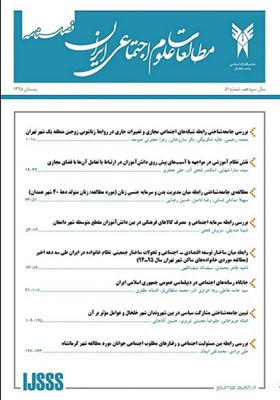کاربست نظریه جامعه شناسی تاریخی اسکاچپول برآثار حضور امام رضا (ع) در ایران
محورهای موضوعی : خانوادهبهراد اسدی 1 , معصومه قره داغی 2 , جعفر آقازاده 3 , منیژه صدری 4
1 - گروه تاریخ، واحد شبستر، دانشگاه آزاد اسلامی، شبستر، ایران
2 - گروه تاریخ، واحد شبستر، دانشگاه آزاد اسلامی، شبستر، ایران
3 - دانشیار گروه تاریخ، دانشگاه محقق اردبیلی، دانشکده ادبیات، اردبیل، ایران
4 - گروه تاریخ، واحد شبستر، دانشگاه آزاد اسلامی، شبستر، ایران
کلید واژه: جامعهشناسی تاریخی, عقلانیت, امام رضا, تهجیر,
چکیده مقاله :
این پژوهش با هدف تبیین تأثیرات سیاسی، اجتماعی و فرهنگی حضور امام رضا (ع) در ایران انجام گرفته است. تهجیر امام رضا (ع) به ایران و حضور روشنگرانه و نواندیشانه دینی ایشان علیرغم فضای سراسر خفقان و بسته دوران مأمون به رشد و گسترش حوزههای نوگرایی دینی و عقلانیت وبری در جدلهای علمی معتزله و اشاعره انجامید. انبساط فضای فکری ایجاد شده در پرتو نظریه جامعهشناسی تاریخی اسکاچپول، مبتنی بر کنشهای معنیدار و هدفمند و بسترهای ساختی، پرسش بنیادین این پژوهش میباشد. این پژوهش برآن است تا با روش کیفی از نوع جامعهشناسی تاریخی، آثار حضور امام رضا (ع) در ایران را تبیین کند. تکنیک گردآوری دادههای این پژوهش اسنادی و کتابخانهای است. در این پژوهش با رویکرد روششناسی تاریخی چنین استنباط میشود که آثار فکرتهای نرمگرایانه امام رضا (ع) در مواجهه با پرسشگران، مخالفان و معاندان سبب برون رفت انجمادگرایی در جامعه شده و ظهور کنشهای معنیدار اجتماعی اسکاچپولی را به ارمغان آورده است.
This study was conducted with the aim of explaining the political, social and cultural effects of the presence of Imam Reza in Iran. Displacement of Imam Reza to Iran and his enlightened and innovative religious presence, despite the terrible and closed environment of the Ma'mun era, led to the growth and expansion of the fields of religious modernity and Weber's rationality in the scientific debates of Mutazilites and Asharites. The expansion of the intellectual space created in the light of Skocpoltheory of historical sociology, based on meaningful and purposeful actions and constructive contexts, is the fundamental question of this research. This study aims to explain the effects of Imam Reza's presence in Iran with a qualitative method of historical sociology. The data collection technique of this research is documentary and library. In this study, with the approach of the historical methodology, it is understood that the effects of Imam Reza's soft-spoken thoughts in the face of questioners, opponents and opponents have led to the exit from ossification in society and it has led to the emergence of significant social actions in Skocpol's.
_||_


